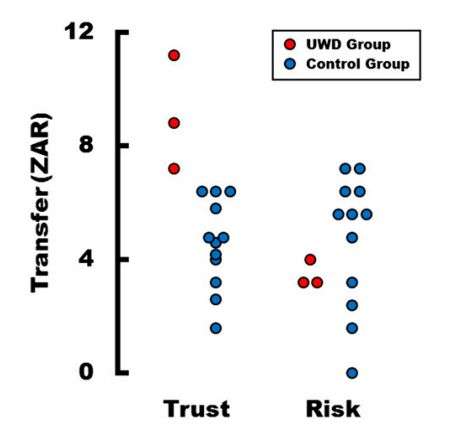January 22, 2013 report
Researchers find certain kind of brain damage can cause people to be more reckless with investments

(Medical Xpress)—A team of researchers from several universities in Europe has found that human test subjects with a damaged portion of their brain were likely to invest more money in a risky trustee than those without the brain damage. In their paper published in the Proceedings of the National Academy of Sciences, the team says the subjects were willing to invest more despite being told that the trustee may not be trustworthy.
In their study, the researchers found that test subjects with damage to the part of their brain known as the basolateral amygdale, but who still had a normally functioning central-medial amygdale, tended to be far more generous in a role-playing game – individuals were asked to offer funds to a trustee who was supposed to invest the funds for them – than those without such brain damage. More surprising was that the test subjects continued to do so despite being made aware of the possibility that the trustee might abscond with their money. When asked why, the test subjects were unable to offer an explanation. Interestingly, there did appear to be a limit however – test subjects were willing to risk up to twice as much money as their non-brain damaged peers, but no more than that.
The researchers suggest that their findings do not indicate a change in risk-taking due to the brain damage, or that the test subjects expected a higher than average return on their investment. Instead, they suggest, it's more likely that the brain damage resulted in problems with comprehending risk assessment. Prior research they say, with mice, has shown that damage to the amygdale resulted in rodents that appeared unable to assess the tradeoff between risk taking and the reward that might come about as a result of engaging in a risky venture.
If further study adds credence to these new findings, it could have implications for investors and people with brain damage. Someone with minor damage to their amygdale (from playing football perhaps) could be living an otherwise normal life, for example, but make poor choices regarding investing, or even buying a house. If the brain damage is subsequently discovered, there would likely be legal implications that could result in changes to how such cases are decided.
More information: "Generous economic investments after basolateral amygdala damage," by Jack van Honk, Christoph Eisenegger, David Terburg, Dan J. Stein, and Barak Morgan, PNAS, 2013. www.pnas.org/cgi/doi/10.1073/pnas.1217316110
Abstract
Contemporary economic models hold that instrumental and impulsive behaviors underlie human social decision making. The amygdala is assumed to be involved in social-economic behavior, but its role in human behavior is poorly understood. Rodent research suggests that the basolateral amygdala (BLA) subserves instrumental behaviors and regulates the central-medial amygdala, which subserves impulsive behaviors. The human amygdala, however, typically is investigated as a single unit. If these rodent data could be translated to humans, selective dysfunction of the human BLA might constrain instrumental social-economic decisions and result in more impulsive social-economic choice behavior. Here we show that humans with selective BLA damage and a functional central-medial amygdala invest nearly 100% more money in unfamiliar others in a trust game than do healthy controls. We furthermore show that this generosity is not caused by risk-taking deviations in nonsocial contexts. Moreover, these BLA-damaged subjects do not expect higher returns or perceive people as more trustworthy, implying that their generous investments are not instrumental in nature. These findings suggest that the human BLA is essential for instrumental behaviors in socialeconomic interactions.
© 2013 Medical Xpress
















